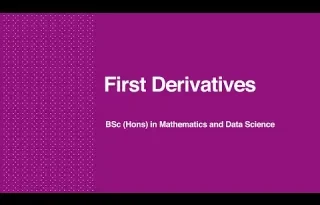BSc (Hons) in Mathematics and Data Science

Search to find a different course
Please note: There will be no intake for this course in September 2025.
Course Overview
This course builds strong foundational knowledge in the areas of Mathematics, Statistics and Programming. Well-rounded computing skills are developed allowing students to focus in on high-tech areas within the data and computing domains. Industry specific topics include: Fundamental and Advanced Statistics Techniques, Applied Probability, Artificial Intelligence, Data Mining and Data Visualisation Techniques. The course is well suited to students who enjoy mathematics and problem-solving, and are looking to develop a more applied, industry-focussed skillset than offered by traditional mathematics courses.
Essential programming capability and Systems knowledge are developed through programming in R & Python, Data/Big Data and Distributed Data Systems. Alongside this students will develop strong mathematical reasoning and in-depth understanding in areas of Computational Mathematics and Mathematical Analysis such as Logic, Number Theory, Linear Algebra, Calculus and Mathematical Modelling.
A love of mathematical problem-solving and numerical reasoning is essential for success on this course, coding is a key element of any data science course, but this is taught from scratch, so there is no requirement for prior knowledge of programming.
What makes this course different
Data Analytics is identified, both nationally and internationally, as a key future skill and the demand for Data Scientists, Data Analysts and highly numerate graduates continues to grow alongside the massive amounts of available data.
This course will prepare students to work in the computing industry by helping to develop both their personal and professional skills in a supportive, positive, and student-centred environment .
Understanding the Industry
Data Science is the study of information - where it comes from, what it tells us and how to turn it into a valuable resource which enables businesses to make decisions, solve complex problems and create strategies to improve results and performance. Data is being used increasingly in every industry, not just in computing. From finance and healthcare to sports and commercial businesses. People capable of pulling solutions from data’s patterns are becoming increasingly valued employees.
Career Opportunities
This course builds advanced skills in programming, mathematics and statistics, databases and data mining, combined with highly developed problem-solving skills and will allow graduates to take on a variety of roles across numerous industries.
Future Careers:
- Data Scientist
- Sport Analyst
- Healthcare Statistician
- Data Analyst
- Data Visualisation Developer
- Junior Intelligence Designer
- Statistician
In these areas:
- Banking
- Finance
- Healthcare
- Sport
Course Delivery and Modules
This course is delivered through a combination of lectures, lab classes and tutorials. There are numerous support services available within the department, and institute, to enable and encourage all students.
- Introduction to Programming for Data Analytics
- Probability & Statistics
- Data Science Fundamentals
- Pre-Calculus
- Logic
- Communication Skills
- Bias in Computing
- Tools for Software Development
- Linear Algebra
- Discrete Mathematics
- Object-Oriented Programming for Data Analytics
- Statistics
- Study Design
- Database Systems
- Geometry
- Analysis
- Project Management
- Big Data Systems
- Number Theory
- Data Visualisation and Insight
- Distributed Data Systems
- Artificial Intelligence
- Applied Probability
- Cryptography
- Analysis
- Work Placement (15 weeks) OR Approved Semester Abroad
- Project
- Machine Learning
- Research Methodology
- Data Mining
- Differential Equations
- Advanced Statistics
- Ethics & Professional Practice in Data Science
- Time Series Analysis
- Mathematical Modelling
Work placement
Students undertake a 15-week work placement in year 3. Students also have the option of undertaking a year of study abroad.
Education Progression
Graduates may progress onto a Level 9 Masters degree.
MSc in Applied Data Science
Fees and Funding
Please find information on fees and funding here: www.dkit.ie/fees
Entry requirements
In addition to the standard entry requirements below, Maths Grade H6 or O2 is also required for Leaving Certificate or QQI applicants. A Merit in QQI Maths for STEM NFQ (5N0556) will also meet this specific Mathematics entry requirement.
Applicants from NI/UK require a GCSE Maths Grade 8/A or AS Level Grade C or A Level Grade E.
- Standard Requirements for Leaving Certificate Applicants
- Standard Requirements for UK/NI Applicants
- Standard Requirements for QQI-Further Education Applicants
Recent CAO points
Ask us a Question
If you have a question about the BSc (Hons) in Mathematics and Data Science please ask it below and we will get back to you.
Department Office
Disclaimer: All module titles are subject to change and for indicative purposes only. All courses are delivered subject to demand and timetables are subject to change. Elective Module options will only run subject to student numbers. The relevant Department will determine the viability of each elective module option proceeding depending on the number of students who choose that option. Students will be offered alternative elective modules on their programme should their preferred elective option not be proceeding. Award Options for Common Entry Programmes: The relevant Department will determine the viability of each award option proceeding depending on the number of students who choose either option. If the numbers for one of the Award options exceed available places, students for this option will be selected based on Academic Merit (highest grades).

